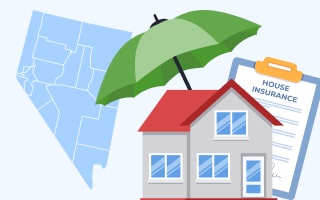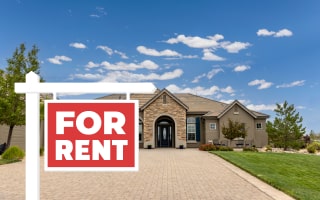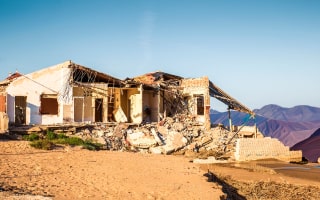Homeowners Insurance in Nevada

The Hoover Dam, Lake Tahoe, Red Rock Canyon, and Death Valley are some of the sights available to visitors of Nevada. If you like aliens, you can also try to visit Area 51. Nevada residents must also deal with frequent earthquakes, wildfires, and crazy winter storms, causing significant property damage and resulting in costly claims. Since 1953, Nevada has had 73 federally declared disasters, and the rate of disasters per 1 million people is 22.73.
Along with damage from ice, snow, and other winter perils and windstorms, Nevada residents also file claims for hail, bodily injury, liability issues, frozen pipes, trees and other debris falling on the house, and water damage.
No state requires homeowners insurance, but experts recommend that every homeowner have at least some coverage. If you borrow money to buy a home in Nevada, your lender or bank will require you to purchase coverage and keep it until the loan is paid off. They will also dictate the coverage levels.
The average rate of homeowners insurance in Nevada is $1265 a year, which is low compared to the national average of $2,728.
Types of Homeowner Insurance Coverage Available in Nevada
Every state has particular insurance providers offering specific coverages based on the assumed perils. Not all carriers operate in all states. The available types of coverage available in Nevada include:
-
Dwelling Coverage: Dwelling coverage pays to repair or replace your home after a covered event, such as a fire, windstorm, or tree damage.
-
Liability Coverage: If someone gets injured on your property and sues you, liability coverage will pay your legal bills.
-
Personal Property: Personal property coverage protects and replaces your belongings after theft or a qualifying event.
-
Medical Payments: When someone is hurt on your property, medical payments pay for their medical bills.
-
Other Structures: Other structures refer to fences, detached garages, sheds, pools, and other items. This insurance will pay to replace them after a covered peril.
-
Additional Living Expenses (ALE): Whenever you need to vacate your home during repairs or rebuilding after a covered disaster, ALE insurance will pay for you to stay at a hotel and pick up your other expenses (food, laundry, pet boarding, furniture rental, etc.).
Nevada has some flooding, so you should also consider a flood policy. FEMA (Federal Emergency Management Agency) manages the National Flood Insurance Program (NFIP) through a network of 50 providers across the U.S.
Since most homeowners insurance does not cover floods, this supplemental coverage can repair damage and replace items after a flood. Depending on the options you choose, it can cover the building and/or your personal belongings. This program is available to homeowners, renters, and businesses. Learn more about the program on FEMA's website.
Home Insurance and Natural Disasters
Climate change is creating many problems for the home insurance industry. Severe storms and other natural disasters are the number one factor driving today's homeowners insurance rates. Over just the past five years, rates have climbed 34% and as high as 60% in some areas. In Nevada, home insurance rates have increased by 21.0%, which is lower than the national average.
Nevada is prone to many earthquakes, wildfires, and heavy winter storms, all of which cause devastating property damage. The average cost to insurers for one wildfire claim is $77,340. Snow and ice damage claims average $11,650, and windstorms and hail cost an average of $11,695 per incident. From 2015 to 2019, insurance providers lost a total of $298,835,200 in claims. From 1980 to 20204, Nevada has had only 27 federally declared disasters, which is far less than many states. In 2023, Nevada had only three tornadoes and, thankfully, no related deaths. However, in 2022, Nevada had 506 wildfires, destroying 58,402 acres and property.
How Can I Save on Homeowner Insurance Premiums in Nevada?
With the price of everything going up, it's no wonder that homeowners are searching for ways to save on their insurance. The key to doing that is knowing what factors are involved and adjusting from there. The factors that most directly impact home insurance are:
-
Location: Where you live matters immensely. If you live in an area with many covered perils or a high crime rate, you will pay more than in a safe area with mild weather.
-
Size of the Home: The larger the home, the more insurance you will pay. Rebuilding will cost more, and your rates must reflect that.
-
Age/Condition of the Home: Older homes in disrepair cost much more to insure than younger, better-maintained homes.
-
Construction Materials: As the cost of construction materials and labor increases, the cost of home insurance also increases.
-
Coverage Amounts: The amount of your coverage also matters. The more you have, the higher your rates will be.
-
Your Credit Score: If you have a good credit score, you will pay less than someone with poor credit.
-
Your Claims History: Someone with many small claims will pay more than someone with a clean claims history.
-
Your Deductible: The lower your deductible, the higher your rates will be. Conversely, the higher the deductible, the lower your rates.
-
Risk Factors: You will pay more if you have extra risk factors, such as a fireplace, pool, trampoline, or tree house.
Some ways to save on your homeowners insurance include:
- Improve Your Credit: Work on improving your credit and then ask your insurance agent to re-assess your rates.
- Don't File Small Claims: Avoid filing small claims and use your insurance only when you really need it.
- Ask for Discounts: Ask your providers for any eligible discounts that might work for you.
- Bundle Your Policies: Bundle your policies together, and your insurance carrier will discount your rates.
- Increase Your Deductible: Raise your deductible as much as possible to reduce your rates.
- Make Home Improvements: Improve your home with a new roof, better siding, fire safety, storm readiness, and home security, and your rates could go down.
- Shop Around: Shop around for a provider. Get multiple quotes before deciding.
- Remain Loyal: If you stay with the same provider for many years, they may offer you better rates each year as a reward for loyalty.
- Beef up Home Security: Improve your home security, and your provider should decrease your premiums.
Home Insurance Discounts in Nevada
Homeowners insurance covers damage to your home and pays to replace or repair it after damage by a qualifying event. Each policy has limits and will only pay according to those limits. That is why reviewing your policy yearly ensures you have enough coverage. Home insurance typically includes personal property protection, liability and medical payments coverage, other structures, and loss of use. If your home burns down in a fire, the insurance company will pay to rebuild it and replace your personal belongings.
You can easily obtain a home insurance policy. The trick is choosing the best provider for you. Once you decide, you can contact them online or via phone to apply and get a quote. Upon signing up, you must pay the first full year in advance. After that, you can pay monthly through your escrow or once a year. It depends on whether you financed your home or not.
Typical home insurance discounts offered by most firms:
- Early Quote Discount: If you ask for a quote well before you need it, your provider could offer you a discount for being proactive.
- Senior Discount: Many firms offer seniors of a certain age discounts on home insurance.
- Military Discount: Most insurance providers discount active military personnel and vets.
- Occupational Discount: Some professions, like firefighters and teachers, also get discounts.
- Claims-Free Discount: Stay claims-free for as long as possible to earn discounts from your insurance provider.
- Safety Discount: Make your home safer with a home security system to avoid theft, vandalism, and break-ins, and you could earn discounts.
- Bundling Discount: Bundle multiple policies together for a discount.
- Paperless Discount: Go paperless for your insurance statements, and your provider will give you a discount.
- Autopay Discount: Sign up for autopay and earn a small premium discount.
- New Roof Discount: Install a more storm-resistant roof, and your provider will discount you.
- Non-smoking Discount: Non-smokers have less fire risk and get lower rates than smokers.
- Smart Home Discount: Install smart home devices to make your home more efficient, monitor for disasters, and earn a discount.
- Green Discount: Install specific eco-friendly devices, and your provider may discount your rates.
- Fire-Safety Discount: Install sprinklers, smoke alarms, and fire extinguishers to earn a discount on your home insurance.
Common Rates Offer by Homeowners Insurance Firms
New homes cost much less to insure. In some cases, new homeowners pay up to 40% less. A house only five years old can save up to 26% off home insurance. New homeowners in Nevada pay an average of $644, far less than most states. Actual prices will vary based on your age, location, credit score, size and condition of the house, etc.
Top 10 Home Insurance Firms in Nevada and Average New Home Savings
| Company | % savings |
|---|---|
| Nationwide | 76% |
| State Farm | 51% |
| Amica Mutual | N/A |
| Travelers | 63% |
| American Family Insurance | 55% |
| USAA | 54% |
| Farmers Insurance | N/A |
| Allstate | 47% |
| Country Financial | N/A |
| Lemonade | N/A |
Home Insurance and Renovations in Nevada

Home renovations are a great way to freshen up your space and add luxury and value to your home. However, upgrades can drastically impact your home insurance rates. Some home improvements decrease your risk and lower rates, while others increase your risk, value, and rates. Some have no effect because they both increase the value but decrease your risk.
![]() Home Renovations that Increase Rates
Home Renovations that Increase Rates
Some home renovations that increase your rates include:
- Adding a Fireplace: Nothing beats the glow of a fire on a cold winter's night, but adding a fireplace to your home will increase your risk of fire and your insurance premiums.
- Upgrading Your Bathroom: These days, the sky is the limit when it comes to bathroom upgrades. Luxury upgrades, though, will increase your home insurance rates.
- Building a Koi Pond: Koi ponds can be very serene, but they also pose a risk, and your rates will increase if you add one.
![]() Home Renovations that Decrease Rates
Home Renovations that Decrease Rates
Some home renovations that decrease your rates include:
- Upgrade Wiring: Old wiring can lead to a fire and damage your home. Being proactive and replacing your wiring before it becomes a danger will help lower your insurance rates.
- Water Alarms & Shut-Off Devices: Water damage is a costly peril. Taking steps to avoid it, like water alarms and automatic shut-off devices, could help you save big on your insurance premiums.
- Install Hurricane Shutters: Hurricane shutters could help prevent damage to your home, even in other types of storms, and they will lower your insurance expenses.
Home insurance does not pay for regular home maintenance or upgrades that you decide to make. It only pays for repairs or replacement of your house after a qualifying event. If, during renovations, someone steals from you or gets hurt, those things are covered. Other things that home insurance does not pay for are rodents, pest infestations, and animal damage.
Always speak to your insurance agent before making any major renovations. They will help you understand the impact on your rates and coverage. Your agent may want to inspect the work once it is done to re-evaluate your limits.
Nevada Renters' Insurance

Renters insurance protects your personal belongings while renting a home rather than buying. It is a form of homeowners insurance but does not include any dwelling coverage. Your landlord must include the dwelling coverage in their own policy. Along with replacing your personal belongings if they are stolen or destroyed in a covered peril, most policies also include liability coverage, medical payments, and loss of use (ALE). Renters insurance has limits, and expensive art, jewelry, and collectibles may not be covered.
When insurance providers price out renters insurance, they factor in the three main items below:
-
Location: Location also matters when you rent. If you live in the city where crime is worse, you will pay more than if you live in the country. If you live in an area with frequent weather disasters, you will also pay more.
-
Coverage Limits: The more coverage you purchase, the higher your premiums will be.
-
Number of Units: The more units in your building, the lower your rates will be.
The national average for homeowners is $14.27 per month. Nevada renters pay slightly less than that, $13.23 per month, making it very affordable. In some places, people pay as little as $10 a month.
Condo Insurance in Nevada

Condo insurance is a type of homeowners insurance that protects condo owners. However, it works a bit differently. Condo associations have their own master policy, which includes dwelling coverage, which will rebuild each building if a covered event destroys it. The master policy will restore each unit back to its original condition (when first built), making it quite dated. Condo owners need insurance to restore the unit to its most recent condition with any upgrades to kitchens, baths, flooring, light fixtures, appliances, etc. Condo insurance also includes personal property protection, liability insurance, medical payments, loss of use, and loss assessment.
Unlike renters insurance, which has no dwelling coverage, condo insurance does, but it is "walls-in", only restoring the unit's interior. Additionally, the liability portion of condo insurance only works if the person is hurt inside the condo, not outside or on common grounds.
Condo insurance covers perils like smoke, fire, theft, vandalism, and windstorms. Some of the items covered under condo insurance include:
- Furniture
- Appliances
- Interior Walls
- Wiring
- Plumbing
- Flooring
- Countertops
- Cabinets
- Light Fixtures
- Personal Belongings
Condo owners in Nevada pay an average of $620 a year or $52 a month for home insurance, which includes $60,000 of personal property coverage and $300,000 of liability coverage, with a $1,000 deductible.
Some ways to save on condo insurance in Nevada include:
- Bundle Your Policies
- Raise Your Deductible
- Improve Your Home's Security
- Install Fire Safety Equipment
- Ask for Discounts
- Keep Your Credit Good
- Shop Around for Quotes
- Skip Small Claims
- Eliminate Risks
Nevada Home Insurance Market
Although the home insurance industry is in a freefall in most areas, Nevada insurers have fared better than others. As profitability is declining in Nevada, insurance providers suffered losses of only one-third as high as those in neighboring states. Climate change dictates the state of the insurance market and how losses pile up and rates climb. If these trends continue, insurance carriers in Nevada will start to experience more serious losses, and some will eliminate coverage while others may limit it or cancel risky clients.
Nevada is considered a safe state with fewer disasters than most. However, residents do have to deal with earthquakes, wildfires, and severe winter storms, which can cause damage and claims. Continued disasters mean more losses for insurers and fewer options for Nevada residents. As competition slims, homeowners may find it harder to get coverage.
State agencies regulate homeowner's insurance providers. These departments monitor each provider and their rates, ensuring fairness and legality. They also investigate customer complaints and sanction guilty firms. In Nevada, that agency is the Division of Insurance, located at 1665 Hot Springs Road, #152, Carson City, NV 89706.
Homeowners Insurance Guide
- Homeowners Insurance in Nevada
- Types of Homeowner Insurance Coverage Available in Nevada
- Home Insurance and Natural Disasters
- How Can I Save on Homeowner Insurance Premiums in Nevada?
- Home Insurance Discounts in Nevada
- Home Insurance and Renovations in Nevada
- Nevada Renters' Insurance
- Condo Insurance in Nevada
- Nevada Home Insurance Market
Instant Access to Nevada Property Records
- Owner(s)
- Deed Records
- Loans & Liens
- Values
- Taxes
- Building Permits
- Purchase History
- Property Details
- And More!
Homeowners Insurance Guide
- Homeowners Insurance in Nevada
- Types of Homeowner Insurance Coverage Available in Nevada
- Home Insurance and Natural Disasters
- How Can I Save on Homeowner Insurance Premiums in Nevada?
- Home Insurance Discounts in Nevada
- Home Insurance and Renovations in Nevada
- Nevada Renters' Insurance
- Condo Insurance in Nevada
- Nevada Home Insurance Market